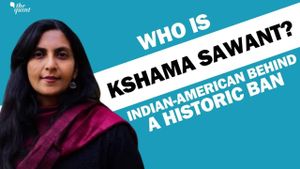Australia's government has made headlines after implementing significant changes to its hate speech legislation, marking a decisive return to action against rising anti-Semitic behavior. The newly passed laws come on the heels of persistent public outcries for effective measures to combat hate speech and discrimination, demonstrating the government’s commitment to address these pressing issues.
On Thursday, the Senate cemented its stance by passing laws with mandatory minimum sentences targeting hate speech crimes. This legislative shift aims to tackle offenses such as displaying hate symbols and financing terrorism, with punishments including jail terms of at least 12 months for displaying hate symbols like Nazi insignias and six years for terror offenses. This brings Australia’s approach to hate speech closer to other nations grappling with similar levels of intolerance.
Jewish leaders have welcomed the new laws, emphasizing their potential to convey a "powerful and much-needed message of zero tolerance to potential perpetrators of these offences," as reported by the Australian Jewish News. Such endorsements underline the social responsibility leaders feel toward protecting minority groups particularly vulnerable to acts of hate.
Yet, not all perspectives are aligned. The Christian education sector has raised concerns, arguing the legislation could be "weaponised" against religious teachings which often espouse traditional views on human identity and morality. Christian schools warn of the ramifications this could have on free speech, indicating their apprehensions about the laws' broader interpretations and implementations.
Meanwhile, conflict has emerged within Australia’s public broadcaster, the ABC, where staff have demanded the corporation renounce its legal position concerning journalist Antoinette Lattouf's claims of racial discrimination. Up to 250 ABC staff voiced their discontent over the ABC arguing against Lattouf’s assertion of being discriminated against due to her Lebanese heritage. The ABC’s current legal approach, along with claims of systemic racism highlighted by the Janke review, suggests the broadcaster is facing pressures both internally and publicly to reconcile their values with actions.
"The ABC’s position destroys any hope of addressing systemic racism," argued the ABC’s National House Committee, pushing for immediate reassessment of its strategies to combat institutional biases.
On the international front, Australia's reputation was again challenged following the tragic deaths of six foreign tourists, including Australian teens Bianca Jones and Holly Bowles, due to methanol poisoning. The two friends succumbed after accidentally consuming methanol during their stay in the tourist town of Vang Vieng, Laos. Subsequent investigations unveiled Laos’s refusal to accept Australian assistance, highlighting potential diplomatic tensions over the investigation.
Independent MP Zoe Daniel urged parliament for updates on the investigation, emphasizing the need for clarity and justice for the affected families. When asked, Deputy Prime Minister Richard Marles expressed disappointment at Laos’s decision, emphasizing the capacity the Australian Federal Police could bring to resolve the matter efficiently.
These developments reflect broader societal shifts, whereby nations and communities are reconciling longstanding attitudes toward minority rights, hate speech, and systemic issues. With public sentiment increasingly supporting legislative changes to protect vulnerable groups, Australia finds itself at the crossroads of achieving equality and free speech.
The ramifications of the legislation, reactions from various factions within society, and the tragic incident involving tourists point toward the complexity of these issues. Increased scrutiny will likely accompany Australia as it navigates the challenging waters of managing hate speech, protecting diverse perspectives, and addressing systemic racism.



